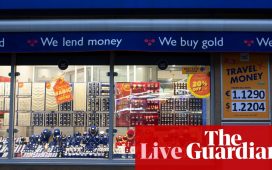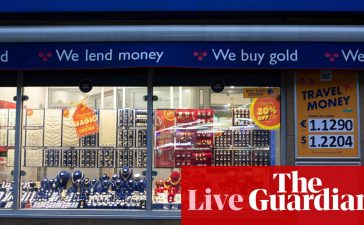Key events
Paramount and Skydance to merge in $28bn deal
Jack Simpson
The family behind Paramount, one of Hollywood’s most iconic companies, has agreed to sell the business to the independent company Skydance.
Paramount chair Shari Redstone, whose father, Sumner, bought the company in 1994, has now given the greenlight to the sale of the family’s controlling stake in company which produced classic films such as The Godfather, Titanic and Chinatown.
Paramount also owns the television network CBS and channels such as MTV and Nickelodeon.
The deal, which values the company at $28bn (£22bn), brings an end to more than six months of negotiations. It will see Skydance and Paramount merge, with Skydance agreeing to invest $8bn into the new company.
Skydance will then pay a further $2.4bn to buy National Amusements, the Redstone-owned theatre movie operator which holds nearly 80% of voting shares in Paramount.
The agreement comes just four years after the death of Sumner Redstone, whose company Viacom bought Paramount Pictures three decades ago in a deal worth $10bn.
Shari took over after his passing but has seen it struggle in recent years with the value of its shares falling by more than 75% in the last five years.
What are the prospects for a government in France? Don’t hold your breath for big changes to spending plans any time soon.
That is the verdict of Claus Vistesen, chief eurozone economist at Pantheon Macroeconomics, a consultancy.
French bonds and the euro initially sold off after the result came, but they are now flat. That is “the right call”, said Vistesen, given the small probability of movement for a while as complex negotiations start. Vistesen wrote:
Grand coalitions, like for example in Germany, are not the norm in France, but that could be the only solution this time around, given the fragmented parliament. The conditions for a minority government to rule, meanwhile, is that it does not face a blocking majority. As an initial base case, we have to assume that the left will attempt to capitalise on its victory to pull any government as far left as possible on economic policy. This, in turn, would increase the risk of a standoff with the EU over fiscal policy. This is why the Euro and French bonds initially sold off in response to the result. They’re now both virtually unchanged on the day, however, which is the right call. A lot of negotiation lies ahead before we see the new government, let alone what it can and can’t do.
The French election has meant that Marine Le Pen’s far-right National Rally (RN) will not be in power, but it has not settled what France’s new government will look like.
The New Popular Front (NFP), the hastily arranged coalition of left-wing parties, won the most seats, but it is far short of a parliamentary majority. The result will mean a lot of negotiation to agree on who will be the new prime minister – let alone on achieving anything meaningful in governing the country.
It means there are some complicated scenarios to weigh up, although for financial markets it also means the likelihood of a major political shift – and with it major spending decisions is put off. That may explain the muted market reaction.
Philippe Ledent, a senior economist at ING, an investment bank, said the result “plunges France further into the unknown”.
The French parliament is more divided than ever, made up mainly of three blocs (Left – 182 seats, Centre – 168 seats, Extreme Right – 143 seats) and a number of smaller ones. As we predicted before the elections, no bloc can claim an absolute majority.
Ledent sketches out two options:
-
Minority government
French political parties “are not used to making concessions in order to create a programme around a coalition with other parties”, and the NFP’s most prominent figure, Jean-Luc Mélenchon demanded its entire programme be implemented. “If political parties maintain such positions, a long period of instability will ensue,” said Ledent.
“Without an absolute majority, and given the radical nature of its socioeconomic programme, the left-wing bloc won’t be able to pass a single law, unless it uses the tool (article 49.3 to force legislation) that it decried so much itself during the previous legislature. A motion of censure would probably be tabled very quickly, bringing down the government.” It is a similar situation if Macron tries to install a prime minister from his own bloc, or even from the right.
Instability would last until at least June 2025, since the president cannot call for new elections before then.
-
Learning to cooperate
“Excluding the 80 MPs from the far left and the 145 from the far right, there are over 350 MPs left to form a broad coalition ready to reform France, taking into account the diversity of opinions. In other European countries, including Germany, such a configuration would be quite natural and would result in a government with a clear majority.
“Certainly, some doors are beginning to open for such a coalition. Of course, the President’s camp is in favour.”
“The French political parties are stuck in a strategic game where the only solution is for the parties to work together. It would help restore calm and political stability. But, not knowing what attitude the other parties will adopt and because any concession on its programme would be seen as a betrayal of its electorate, no party seems willing to enter into discussions in the very short term.”
France’s Cac 40 index swings into positive territory for the day
After an initial drop, France’s benchmark Cac 40 index has also swivelled into positive territory.
Shares in Paris are up by 0.36%.
Investors often favour political stalemates, as they can reduce the scope for policies that will markedly change a country’s fiscal position.
The FTSE 100 has now edged into the black for today: it is up by 0.02%.
B&M European Value Retail, the owner of B&M Bargains, is the biggest riser, up 2.1%.
Marston’s abandons brewing after 149 years in £206m Carlsberg deal
Shares in pub company Marston’s have surged by 20% after it agreed for Carlsberg to buy out its part of a brewing joint venture for £206m.
The deal means that Marston’s will abandon its roots as a brewer – previously known as Wolverhampton & Dudley Breweries – stretching back to 1875. Carlsberg will take complete control of ales including Hobgoblin, Brakspear, Pedigree and Wainwright.
Marston’s first gave up 60% of the brewing business to Carlsberg in 2020, part of a broader consolidation in the brewing industry that saw the biggest brewers take over smaller companies.
The latest deal, a buyout of the remaining 40% of the joint venture, means Marston’s will be left running its estate of about 1,370 pubs. The pubs are mainly located in suburbs around the UK.
Marston’s said the deal would cut its annual interest bill by £18m.
Justin Platt, Marston’s chief executive, said:
Our core capability and key opportunity to unlock value for shareholders is in driving a focused and successful pub business.
This deal further strengthens our balance sheet, significantly reducing our debt by over £200m. In addition, CMBC remain valued strategic partners and we continue to benefit from our ongoing long-term brand distribution agreement with them. Crucially, it allows us to become a pure play hospitality business and focus on what we do best – namely, giving our guests amazing pub experiences.
The FTSE 100 in London has also dipped in the opening trades. It was down by 0.3%.
That appeared to have been driven partly by a drop in gold and silver prices, which weighed on mining company stocks. The top five fallers were the mining contingent: Anglo American, Endeavour Mining, Rio Tinto, Antofagasta and Glencore. They were all down by between 0.9% and 1.5%.
Elsewhere Germany’s Dax index was down 0.1%, Spain’s Ibex was down 0.2%, and the Euro Stoxx index dropped 0.2%.
Cac 40 stock index drops after France election surprise; Britvic to be bought by Carlsberg
Good morning, and welcome to our live, rolling coverage of business, economics and financial markets.
France’s left-wing coalition came first in the second round of its parliamentary election in a shock result that keeps the far-right out of power. Investors are bracing for uncertainty as they wait to see whether the left can work with President Emmanuel Macron’s centrist Together alliance.
France’s benchmark stock index, the Cac 40, dropped by 0.5% in the opening trades on Monday morning.
The euro dipped as currency markets opened on Sunday evening, dropping as low as $1.08 against the US dollar. However, it recovered most of its losses on Monday morning as investors weighted up the prospect of a period of political gridlock as the left-wing New Popular Front tries to work with Together.
France’s Cac 40 stock market index was due to drop by 0.6% when stock markets open on Monday morning.
Holger Schmieding, an economist at Berenberg, an investment bank, said the election would spell the end for Macron’s investor-friendly reforms. He said:
The political forces that joined forces to prevent an RN government have little else in common. Their views on migration, social and cultural issues, fiscal policy and the need for pro-growth reforms are often diametrically opposed. Forming a government will not be easy. Times are tough, emotions are running high – and France has no tradition of forging coalitions between parties of very different political persuasions.
Britvic agrees to sweetened Carlsberg offer
On UK stock markets, FTSE 250 drinks maker Britvic has agreed to a takeover by Danish brewer Carlsberg after a sweetened deal valued the Fruit Shoot maker at £3.3bn.
Britvic shareholders will be entitled to receive £13.15 per share, versus a close of £12.10 on Friday and 36% above the £9.70 price on 19 June, when news of the takeover got out.
The company, which also makes the J2O juice drink and Robinson’s squash, had initially rejected a £3.1bn offer on 21 June.
Britvic’s directors will unanimously vote in favour of the acquisition, the company said on Monday morning in a statement to the stock market. It will be only the latest in a series of foreign takeovers of prominent British companies.
Carlsberg’s executives and bankers have been busy: they have also bought out the share of UK company Marston’s in a brewery joint venture. More details of that deal to come.








